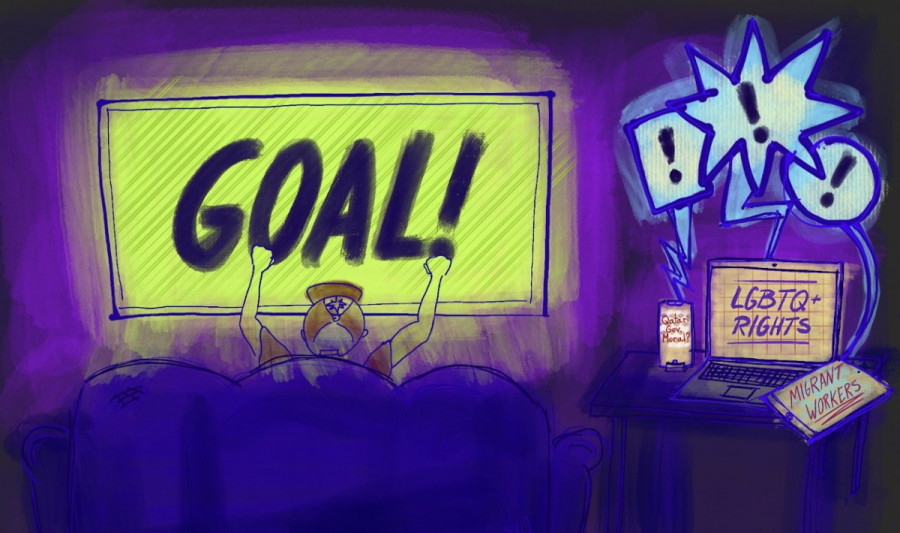The Dichotomy of the 2022 FIFA World Cup: Montrealers Express their Opinions
Local Fans Debate the Importance of Recognizing Socio-Political Issues at a World-Renowned Sporting Event
Canadian records have been broken this year at the 2022 FIFA World Cup, which comes at a time of severe controversy for the host nation, Qatar. Here in Montreal, fans of the sport share mixed sentiments about the situation.
Canadian records have been broken this year at the 2022 FIFA World Cup, which comes at a time of severe controversy for the host nation, Qatar. Here in Montreal, fans of the sport share mixed sentiments about the situation.
On one hand, the Canadian men’s soccer team has outperformed their predecessors. The team qualified for the Cup for the first time in 36 years, beating Jamaica 4-0 at the qualifiers earlier this year. They then went on to make Canadian history as star midfielder Alphonso Davies became the first Canadian player to score a goal at the men’s World Cup. The mark was an astounding achievement despite the team’s subsequent elimination.
Twenty-two year-old Pola Youssef from the South Shore has been a fan of soccer—or football, as he prefers to call it—since he was around 5 years old. He has eagerly been keeping up with Canada’s performance in the World Cup since it started.
“Coming into the World Cup, we had a little bit of hope,” Youssef explained. He states that during the qualification rounds earlier this year, Canada outperformed both the United States and Mexico. “We always expect the U.S. and Mexico to qualify easily, so the fact that Canada was there [and] even better than them, that was very surprising.”
Head coach of the Concordia Stingers soccer teams and former Major League Soccer player Greg Sutton shared his own thoughts regarding Canada at the World Cup. Sutton’s major league career spans from 1999 to 2012; a time during which he played for the likes of CF Montreal (previously known as Montreal Impact), Toronto FC, the New York Red Bulls, and more. He even spent some time on the national team himself in 2004 for a men’s World Cup team development camp.
“To have that opportunity to watch them on the world stage was really exciting, as a former player,” said Sutton. In terms of the next FIFA World Cup in 2026, Sutton is optimistic that the Canadian team will be more successful given their performance at this year’s event.
Many Montreal fans were particularly impressed by Canada’s star player, Alfonso Davies. Davies scored a goal two minutes into Canada’s match against Croatia, breaking Canadian records.
Youssef remarked that Davies is an amazing player for his achievements on the Canadian team, and continues to be an amazing player on the field even outside of this event.
Tomas Landon, a Concordia student and long-time enjoyer of soccer, shared similar sentiments as Youssef towards star player Davies.
“There was a lot of buzz around him before he left Vancouver,” Landon stated, with regards to Davies’ previous reputation as a player for Bayern Munich FC, a well-known German soccer team in the European leagues. Landon has been observing how Davies became a role model to many young Canadians. “I think it’s great for young people in the country to have a star to look up to,” he said.
However, Canada’s performance is in many ways shadowed by the socio-political issues coming to light at this year’s FIFA World Cup. Qatar has faced heavy criticism from human rights advocates worldwide in regards to the country’s treatment of the migrant workers who helped to build the various World Cup facilities, as well as its controversial laws that have altered the usual atmosphere of the event.
According to a Human Rights Watch article published on Nov. 27,, the cost of building this year’s World Cup in Qatar reached figures of around $220 billion.
“Could the money have been spent differently? Absolutely.” stated Sutton. He expressed that the ‘deeper question’ is why the amount of money spent needs to be directed at FIFA as an organization, and why Qatar was chosen as the host country of this year’s World Cup. “Was it done fairly, was it done without bias?”
Aside from monetary controversy, Al Jazeera reported that an estimated 6,500 migrant workers have died since the start of the World Cup’s construction. This is a statement which has been heavily devalued by the host nation, who continues to insist that many of these deaths were due to ‘natural causes’ and not work site incidents.
“There is a massive lack of responsibility on the part of the Qatari government who recognized these numbers,” Landon expressed. He feels that FIFA representatives and Qatari government representatives have been trying to cover up the importance of this issue.
He equally felt strongly about the discriminatory measures that have surrounded the World Cup this year. “I think it’s really shocking that all the teams were [told] that they couldn’t have the LGBTQIA2+ armbands,” said Landon. He couldn’t believe that the German team, who had the word “LOVE” harmlessly written on the inside of their shirts, were told to remove the writing.
So, where do we draw the line between entertainment and political awareness? As professional soccer garners more and more of an audience over time, how can we, as a society, justify the corruption and human rights abuses that take place behind the scenes at events such as the World Cup?
The general consensus among local fans is that, while these issues are highly relevant and important, they don't prevent most viewers from enjoying the World Cup.
“It’s disappointing because I think the basic premise of soccer is the world game, and everybody should be able to have an opportunity to play it and experience it,” remarked Sutton. “Sometimes money gets in the way, unfortunately.”
Sutton believes that it is largely up to the participating teams to make a significant socio-political impact. Like how the German team subtly modified their jerseys in support of LGBTQIA2+ rights, teams must find small ways to encourage change.
“There has to be something that we as a society learn from and gain from, and become better [from]” he commented. “That falls on the teams participating.”
Landon found that, while the ongoing controversies surrounding Qatar and the World Cup are highly concerning, at the very least they have been brought to light through the popularity of the event. He mentioned that the issues surrounding migrant workers rights in Qatar existed before the World Cup started, but that they were not being talked about.
“I guess the fact that this big tournament is being held there does provide a chance for that to be exposed,” He said.
Broadly, spectators feel as though they cannot be blamed for the moral atrocities that take place at their favourite sporting events. However, viewers such as Landon and Sutton believe that a point can still be made to recognize these injustices while enjoying the event. According to them, perhaps it is not the duty of the audience to feel responsible for the actions of a country’s government or an organization, but it would not take much for viewers to spread awareness.
FIFA: the world is watching you — in more ways than you think.


_600_832_s.png)

4_600_375_90_s_c1.jpg)


